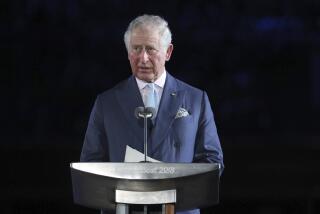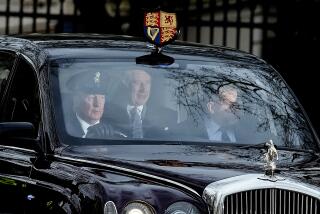Saudi Arabia’s King Hospitalized
- Share via
RIYADH, Saudi Arabia — King Fahd, the elderly Saudi ruler whose actions to strengthen the oil kingdom’s ties with the United States provoked the wrath of Islamic militants, was hospitalized Friday, apparently with pneumonia.
“King Fahd is well, thank God, and the medical tests he is undergoing are proceeding in a normal way,” the official SPA news agency quoted an official as saying. It did not give further details.
Fahd’s half-brother, Crown Prince Abdullah, has been Saudi Arabia’s de facto ruler since Fahd suffered a debilitating stroke in 1995. Abdullah is expected to become king if Fahd dies.
Saudi Arabia’s strategic importance as holder of the world’s largest oil reserves and as home to two of Islam’s holiest shrines means even a stable succession could affect world markets and have widespread political fallout.
The news agency said only that Fahd, who is believed to be 82, had been admitted to King Faisal Specialist Hospital in Riyadh for unspecified tests.
Reports of Fahd’s deteriorating health were blamed for sending the Saudi stock market tumbling 5% earlier in the week. Friday’s news that he was hospitalized helped push crude oil futures to near $52 a barrel ahead of Memorial Day weekend, the start of the summer driving season in the U.S.
An Arab official, speaking on condition of anonymity because of the sensitivity of the situation, said the Saudi government had put the kingdom, the world’s largest oil exporter, on a state of alert and had canceled military leaves.
Other officials confirmed the alert among security forces and said that leaves were being discouraged and that government meetings with foreign dignitaries would be canceled.
The Interior Ministry denied that any emergency had been declared.
“This is absolutely not true,” said Brig. Gen. Mansour Turki, a ministry spokesman. “There’s no canceling of leaves and no state of emergency or anything.”
Abdullah has overseen the kingdom’s crackdown on Islamic extremists since followers of Saudi-born Osama bin Laden launched a wave of attacks. He sought to rebuild relations with the United States in the wake of the Sept. 11 attacks. Fifteen of the 19 hijackers were Saudi.
Fahd, who is the son of Ibn Saud, the founder of modern Saudi Arabia, brought the kingdom closer to the United States. His most significant action was a step that enraged many Islamic extremists: allowing the basing of U.S. troops on Saudi soil after the 1990 Iraqi invasion of Kuwait.
Bin Laden cited the U.S. troops’ presence as a main reason for launching the Sept. 11 attacks and a wave of violence inside the kingdom.
The U.S. military withdrew all its combat forces from Saudi Arabia in 2003. A small contingent stayed in a training and advisory role.
More to Read
Sign up for Essential California
The most important California stories and recommendations in your inbox every morning.
You may occasionally receive promotional content from the Los Angeles Times.










